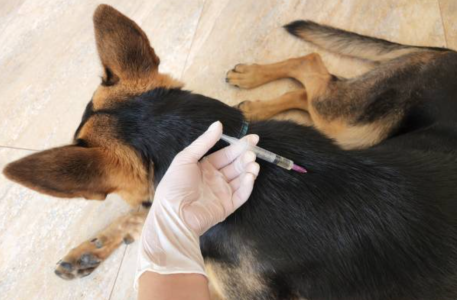Deadly outbreak spreading in some areas, pet owners warned: 'It got really bad'
By
Gian T
- Replies 2
As floodwaters start to recede in parts of the region, a new threat is emerging, posing a serious risk to our furry companions.
Already dealing with the aftermath of severe flooding, the area is now seeing a concerning rise in a potentially fatal bacterial illness affecting dogs.
This spike in cases has led to recent losses, causing growing concern among pet owners and veterinarians.
Leptospirosis is caused by the Leptospira bacteria, which thrive in warm, moist environments—conditions that are too common in northern Australia, especially during the wet season.
The bacteria can spread through water or soil contaminated with the urine of infected animals, such as rats, cattle, pigs, and even other dogs.
When our furry friends come into contact with these contaminated areas, they are at risk of contracting the disease.
The recent floods have exacerbated the situation, creating ideal breeding grounds for the bacteria and increasing the chances of infection.
Dr Graham Lauridsen, a director at Tropical Vets with clinics throughout North Queensland, has reported an unusually high number of sick dogs.
'In a normal wet season, we might see one or two cases a week,' he explains. 'But now, we're seeing several cases every day. It's got really bad.'
Unfortunately, leptospirosis symptoms in dogs are vague, making early detection challenging.
A dog may seem unwell, exhibiting signs such as loss of appetite, vomiting, diarrhea, lethargy, and jaundice, indicated by a yellowing of the eyes.
The disease may have already progressed significantly by the time these symptoms become apparent.
'Literally, in the past two days, it got really bad,' Dr Lauridsen warned.
'Once they're quite badly affected, eight out of 10 will not survive,'
'But at the moment, Innisfail's seen three or four, Ingham's seen over 10, the Tully guys had a couple the other day, and they're seeing them every day coming in now.'
The good news is that a vaccine is available for dogs that can protect them against leptospirosis.
The vaccine requires two doses and has been shown to be very effective.
However, recent years have seen disruptions in vaccine supplies, including a nationwide shortage and a voluntary recall of one brand following adverse reactions.
Thankfully, a new vaccine, Nobivac Lepto 2, has been made available and proved safe and effective.
Despite the rise in canine cases, Queensland Health has reported no significant increase in human leptospirosis cases due to the flooding.
Humans can contract the disease through similar means as dogs, but there is currently no vaccine available for people.
Preventative measures for humans include frequent handwashing, covering wounds with waterproof dressings, and wearing protective equipment, especially for those working in high-risk professions like agriculture.
For our senior community members with furry family members, taking action now is crucial to protect your pets.
If you live in or near flood-affected areas, consider getting your dog vaccinated as soon as possible.
Keep an eye out for any signs of illness and seek veterinary care immediately if you suspect your dog may be infected.
In previous news, residents in Far North Queensland have been strongly advised to stay away from their homes as deadly floods continue to worsen.
With some areas receiving over 1.2 metres of rain, thousands have faced power outages, and more homes remain at risk of being submerged. You can read more about it here.

Have you taken any steps to protect your pets from health risks after the floods? Are you considering vaccinating your dog against leptospirosis after this recent outbreak? Let us know in the comments below.
Already dealing with the aftermath of severe flooding, the area is now seeing a concerning rise in a potentially fatal bacterial illness affecting dogs.
This spike in cases has led to recent losses, causing growing concern among pet owners and veterinarians.
Leptospirosis is caused by the Leptospira bacteria, which thrive in warm, moist environments—conditions that are too common in northern Australia, especially during the wet season.
The bacteria can spread through water or soil contaminated with the urine of infected animals, such as rats, cattle, pigs, and even other dogs.
When our furry friends come into contact with these contaminated areas, they are at risk of contracting the disease.
The recent floods have exacerbated the situation, creating ideal breeding grounds for the bacteria and increasing the chances of infection.
Dr Graham Lauridsen, a director at Tropical Vets with clinics throughout North Queensland, has reported an unusually high number of sick dogs.
'In a normal wet season, we might see one or two cases a week,' he explains. 'But now, we're seeing several cases every day. It's got really bad.'
Unfortunately, leptospirosis symptoms in dogs are vague, making early detection challenging.
A dog may seem unwell, exhibiting signs such as loss of appetite, vomiting, diarrhea, lethargy, and jaundice, indicated by a yellowing of the eyes.
The disease may have already progressed significantly by the time these symptoms become apparent.
'Literally, in the past two days, it got really bad,' Dr Lauridsen warned.
'Once they're quite badly affected, eight out of 10 will not survive,'
'But at the moment, Innisfail's seen three or four, Ingham's seen over 10, the Tully guys had a couple the other day, and they're seeing them every day coming in now.'
The good news is that a vaccine is available for dogs that can protect them against leptospirosis.
The vaccine requires two doses and has been shown to be very effective.
However, recent years have seen disruptions in vaccine supplies, including a nationwide shortage and a voluntary recall of one brand following adverse reactions.
Thankfully, a new vaccine, Nobivac Lepto 2, has been made available and proved safe and effective.
Despite the rise in canine cases, Queensland Health has reported no significant increase in human leptospirosis cases due to the flooding.
Humans can contract the disease through similar means as dogs, but there is currently no vaccine available for people.
Preventative measures for humans include frequent handwashing, covering wounds with waterproof dressings, and wearing protective equipment, especially for those working in high-risk professions like agriculture.
For our senior community members with furry family members, taking action now is crucial to protect your pets.
If you live in or near flood-affected areas, consider getting your dog vaccinated as soon as possible.
Keep an eye out for any signs of illness and seek veterinary care immediately if you suspect your dog may be infected.
In previous news, residents in Far North Queensland have been strongly advised to stay away from their homes as deadly floods continue to worsen.
With some areas receiving over 1.2 metres of rain, thousands have faced power outages, and more homes remain at risk of being submerged. You can read more about it here.
Key Takeaways
- North Queensland is experiencing an unusually high number of leptospirosis cases in dogs following recent flooding, with several dogs dying.
- Veterinarians are urging dog owners to vaccinate their pets and be vigilant for disease symptoms.
- A new vaccine, Nobivac Lepto 2, is available and considered very good and effective against leptospirosis in dogs.
- Human cases of leptospirosis in North Queensland have not increased following the floods, and there is currently no vaccine for humans.








